In “This Is How Technology Ruins Society” news this week, Facebook used a dead young woman’s tagged photo to advertise a dating site. Once it was brought to their attention, the social media site issued an apology and removed the ad. What makes this story even more tragic are the details surrounding the death of the woman in the image. Rehtaeh Parsons took her own life this past April after severe, aggressive and relentless online bullying following a sexual assault.
This incident sheds light on the larger story of how long our online identities live beyond our physical existence and how the sites where we are building and sharing our identities are using what we consider our personal content to earn revenue from their advertisers, mostly without our explicit permission. When my best friend died in 2009, Facebook was not yet using the photos we’d uploaded of our college days and fun nights out to promote weight loss, vacations or dating sites. In the aftermath of her very unexpected and painful death, I can’t imagine how upset I would be if I looked to the right panel of Facebook and saw her smiling face hawking some jewelry line or teeth whitening (she has a great smile, I wouldn’t put it past the algorithm to pick that up). I will say, I’m glad that her page wasn’t immediately removed in the months after her death, as her friends, family, coworkers and even people who didn’t know her sought to share their grief through posting memories of better times.
Never did I think that the 21st century of a baby book of memories, the Facebook album dedicated to the life of a child, would become fodder for online ads. The advancement in technology – facial recognition, anyone! – means that even if you don’t tag a person, the Internet can still recognize them, associate that image with them and connect the two with a simple search. Almost frightening and…sentient, isn’t it? Because of this, I refrain from posting pictures of the children of friends. What was a funny picture of a 1-year-old smearing cake on their face at their birthday party isn’t so funny when they’re in middle school and trying not to stand out as the “weird kid.” Interestingly enough, the FTC is creeped out as well. The federal regulator is launching an investigation to see if the latest round of privacy setting allowing advertisers to use photos violates a 2011 agreement.
Apparently, I’m not the only one with this thought, as evidenced by a recent wildly popular post by Amy Webb of Slate. Webb said that she and her husband refuse to post images of their daughter on the Internet- the Internet responded by finding pictures that other people had posted. Ahh, Internet justice, is there anything sweeter?
I think it may be too late for me; my face is out there, for better or worse. Thankfully I learned (fairly) quickly that putting down your drink of choice and not giving any ironic/offensive/odd facial and hand expressions makes for a safer (for life and job searches) online social presence.
What do you think of the fact that you can no longer disappear online? Did you start curbing and editing your identity?

